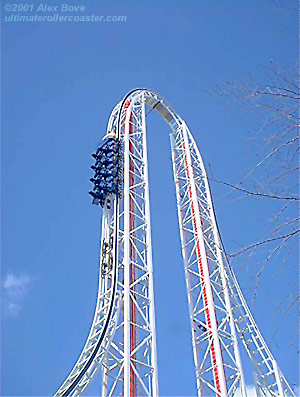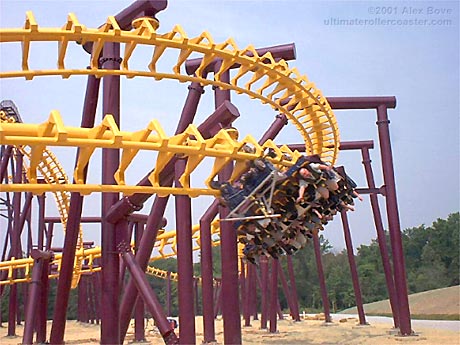|
|
|
 |
|
Roller coaster design
companies are in constant competition, and new innovations are being made
in the field each year. While most roller coasters ride along a continuous
track, with riders boarding and exiting at the same station platform, some
new rides use Linear Induction Motors (LIMs) to launch the ride forward.
These motors are giant electromagnets along the length of the track that
propel the vehicle. These shuttle coasters launch to the end of the track,
stall, then complete the track in reverse to end back at the station. "Superman:
The Escape" at Six Flags Magic Mountain in California uses Linear Synchronous
Motors (LSMs) to propel its riders 100 mph up a 400 foot vertical tower
before sending them plummeting back down. Similar to LIMs, the LSMs on "Superman"
accelerate it faster than a Porsche 911. |
|
|
 |
|
The newest
and fastest way to launch a coaster is air power. "Hypersonic XLC",
which opened at King's Dominion in Virginia in 2001 (pictured right), uses
compressed air to blast its riders from zero-to-eighty in two seconds. Riders
feel the same power fighter pilots experience when launching from an aircraft
carrier. |
|
|
|
|
 |
|
|
 |
|
|
|
 |
|
|
We have
learned about roller coasters that ride above the track and some that ride
below, but what if a coaster could do both? Flying coasters have special
restraints that allow riders to ride above the track, lying on their backs
looking up. These same cars can then flip over to ride below the track,
with riders lying on their stomachs looking down at the ground below. An
amazing array of new loop combinations is possible with new flying coasters. |
|
|
| Another
innovative concept for those adventurous riders who can't decide what side
of the track they want to be on is the Arrow 4th Dimension coaster. These
have seats on either side of the track that can be rotated using special
switches on the track. The result is that you can do a backflip while running
on a perfectly straight piece of track. As you might guess, the sensation
is like no other. There is only one 4th DImension coaster as of 2002: "X"
at Six Flags Magic Mountain, California (pictured right) |
|
|
|
|
 |
|
|
|
|
|
Designers are also
using virtual reality to enhance the riding experience. "Spiderman"
at Universal Studios in Orlando uses 3-D glasses to seamlessly merge reality
with video (Goldberg). Riders experience a 400-foot virtual drop, a feat
that would be difficult and expensive to produce form real steel and concrete.
The popularity of virtual rides has not been as great as estimated, however,
because most riders want to actually experience the high thrills of a roller
coaster, not just be fooled into thinking they did. Also, virtual rides
can be more nauseating than the real thing, because what you see on the
screen doesn't line up with the forces acting on your body. There is no
need to fear though, because real roller coasters are continuing to get
taller, faster, and more twisted every year. Someday we may actually see
that 400-foot drop. |
|
|
|
|
 |
 |
 |
 |
 |
 |
 |
 |
 |
 |
 |
 |
 |
 |
 |
 |









